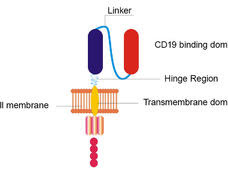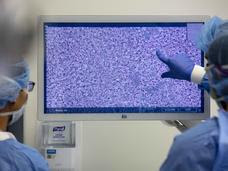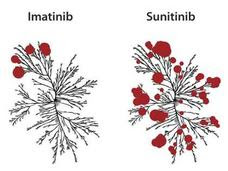
| Clinical Trials | ||
| Updates from the National Cancer Institute | ||
| Clinical Trials News | ||
 | Remodeled CAR T-Cell Therapy Reduces Side Effects in First Clinical Trial A remodeled CAR T-cell therapy causes fewer neurological side effects and is equally effective as the original form of the treatment, according to results from the first clinical trial testing the approach in patients with B-cell lymphomas. | |
 | Artificial Intelligence Expedites Brain Tumor Diagnosis during Surgery A method that combines artificial intelligence with an advanced imaging technology can accurately diagnose brain tumors in fewer than 3 minutes during surgery, a new study shows. The approach, which can also accurately distinguish tumor from healthy tissue, was tested in a multicenter clinical trial. | |
 | Avapritinib Approved to Treat GIST with a Rare Gene Alteration The Food and Drug Administration (FDA) has approved avapritinib (Ayvakit) for adults with metastatic or unresectable gastrointestinal stromal tumors (GIST) whose tumors have an alteration in a portion of the PDGFRA gene. The approval was based on response rate and safety results from a phase 1 clinical trial. | |
 | Video - Should You Join a Clinical Trial? This new video explains three reasons why a patient should considering joining a cancer clinical trial. | |
| Clinical Trials Information for Patients and Caregivers | ||
| Randomization and Bias in Cancer Clinical Trials In some phase 2 and all phase 3 clinical trials, patients are assigned to groups that receive different treatments. The process of assigning patients to these groups by chance is called randomization. This page and the resources below explain why and how patients are randomized in clinical trials. | ||
 | Infographic – Clinical Trial Randomization View this infographic to learn more about how people participating in clinical trials are randomly assigned, or randomized, to different treatment groups. | |
 | Video – Randomization in Clinical Trials Learn how researchers randomly assign clinical trial participants to different treatment groups in order to prevent bias in the results. | |
| NCI-Supported Clinical Trials That Are Recruiting Patients | ||
| Preventing Anal Cancer in People with HIV and Anal Lesions This phase 3 trial is testing how well topical or ablative treatments work in preventing anal cancer in people with HIV and anal high-grade squamous intraepithelial lesions. Doctors will compare topical or ablative treatment with active monitoring to see if treating these lesions helps prevent anal cancer from developing. | ||
| Combining Immunotherapy and a Targeted Drug for Rare Genitourinary Cancers This phase 2 trial will test the targeted drug cabozantinib (Cabometyx/Cometriq) added to the immunotherapy drugs nivolumab (Opdivo) and ipilimumab (Yervoy) for patients with advanced or metastatic rare cancers of the genitourinary tract. Doctors will examine the objective response rates to the combination therapy for each type of cancer studied. They will also assess overall survival, progression-free survival, and the safety of the regimen. | ||
| Experimental Drug for Relapsed Small Cell Lung Cancer or Other Small Cell Cancers This phase 2 trial will test how well an experimental drug named M6620 works when added to the chemotherapy drug topotecan (Hycamtin) for patients with relapsed small cell lung cancer or small cell cancer outside of the lungs (extrapulmonary small cell cancer). Doctors want to see if adding M6620 to topotecan increases the duration of progression-free survival, overall survival, and overall response rate. | ||





















.png)












No hay comentarios:
Publicar un comentario